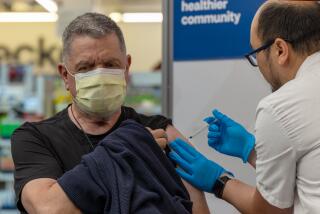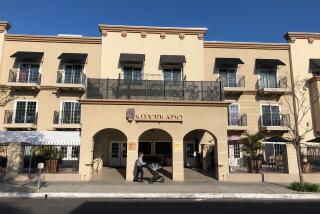Expanded coronavirus testing in nursing homes could uncover a higher toll

As coronavirus continues its destructive spread through nursing homes, Brier Oak on Sunset, a low-slung brick building next to a pizza parlor in Hollywood has earned a sad distinction -- it has reported nearly twice as many cases as the next biggest outbreak in Los Angeles County.
But that’s at least in part because Brier Oak tested almost every resident and employee weeks ago, an aggressive step public health officials were not recommending and few other homes were willing to take.
That is about to change, and the number of reported COVID-19 cases at nursing homes is expected to rise sharply in the days and weeks ahead.
On Wednesday, Los Angeles County health director Dr. Barbara Ferrer, in a major policy shift, announced that nursing homes are now being advised to test all residents and staff, not just those who show symptoms. The previous guidance, to test only those who showed symptoms, was a mistake, she said.
“We were wrong,” Ferrer said at a news conference before announcing the new recommendations, which follow a similar shift in state policy.
Testing only people with symptoms has likely resulted in a significant undercount of cases at nursing homes, experts say, where the ever-climbing number of people falling ill and dying is already a national tragedy.
“We expect to see the number of cases that get reported to skyrocket, and we expect to see the number of deaths that get reported to skyrocket,” with universal testing, said Dr. Michael Wasserman, president of the California Assn. of Long Term Care Medicine, which represents doctors, nurses and others working in long-term care facilities.
More than 3,000 staff and residents of institutional living facilities -- mostly nursing homes -- have tested positive for the virus in Los Angeles County so far. About 40% of the 292 people who have died in the county have been nursing home residents.
Brier Oak on Sunset, with 186 coronavirus cases, had by far the biggest outbreak in Los Angeles County as of Thursday morning. The nursing home with the second-highest number, Hollywood Premier Healthcare, reported 101 infected staff and residents.
Brier Oak’s coronavirus ordeal started at the end of March, said director of operations Aaron Robin, when two patients who arrived after being discharged from hospitals started showing symptoms. They were isolated and tested, and the positive results arrived around April 1.
Then Brier Oak tested all of the staff who’d had contact with those patients, even though none of the employees were showing symptoms, said Budgie Amparo, director of clinical operations. Fifteen of them came back positive.
“With that number, now you have to be concerned about the possible exposure of everybody,” Amparo said, because those employees had gone everywhere in the facility.
At about the same time, a professional acquaintance who is chief medical officer at the Los Angeles Jewish Home had received about 500 hundred test kits from the city of Los Angeles. He offered to share half of them with Brier Oak.
That left them with a tricky decision, given the general reluctance within the industry to become associated with the deadly disease.
“There were people saying to us do you really want to do this because it could create a lot of ‘noise,’ ” Amparo said, referring to negative publicity. “But you come to a point when you just have to do the right thing for the residents and the staff.”
So they tested everyone: 95% of the residents had the virus, 75% of staff had it too, Amparo said.
Three of the residents have died, Amparo said. None of the employees has died or even been hospitalized, Amparo said.
A Brier Oak nurse assistant, who asked not to be named for fear of retaliation, said she remembers watching as patients started getting fevers and diarrhea. The staff didn’t realize patients had the virus, she said, thinking maybe there were issues with the food.
Then employees started getting sick, she said. Some didn’t want to enter the isolation rooms, others weren’t showing up at all.
“They were scared,” she said. “Everyone was scared.”
The nurse assistant said she was tested for coronavirus in early April and had to keep calling to try and get the results. Eventually, she was informed she had tested positive.
But she only learned the actual number of coronavirus cases at Brier Oak through the news, after the state health department released that information last weekend, she said.
“The number is outrageous. So many of our patients, so many of our staff,” she said, breaking down in tears. “It’s just sad.”
Another nurse assistant who tested positive, who also asked that her name not be used, said she spent nine days at home and her heart was beating so fast she thought she was going to have a heart attack.
But when she received a call asking if she felt healthy enough to return to work, she agreed to do so. She is only caring for COVID-19-positive patients and isn’t worried. Many of her colleagues feel the same way, she said.
“Everyone is positive, but we’re all fine,” she said. “We’re already positive, what else can happen to us?”
John Plimpton, 81, a patient at Brier Oak since mid-February, said he and his roommate were tested about two weeks ago. His roommate was supposed to leave, but he had to wait for the results, Plimpton said.
Both tests came back positive.
“I haven’t had any symptoms whatsoever,” Plimpton said. But he, too, said he didn’t learn the scope of the outbreak until his roommate received a message from somebody after the state released the numbers.
“We don’t really get a whole lot of hard information,” Plimpton said. “They don’t come in and give us any official information -- or very, very little. If I depended on that and nobody else ... I wouldn’t know much of anything, to tell you the truth.”
There was a TV news crew out front on Tuesday, Plimpton said, and everyone was talking about that.
Despite the staggering number of cases, conditions inside Brier Oak aren’t as grim as you might think, Plimpton said.
“If a lot of people were dying in here and it was really bad, then I’d probably get a little scared,” he said. “I don’t really worry about it too much, because there’s really not much I can do.”
“I’m too old to start worrying,” Plimpton said. “I’ve had a good life.”
More to Read
Sign up for Essential California
The most important California stories and recommendations in your inbox every morning.
You may occasionally receive promotional content from the Los Angeles Times.












